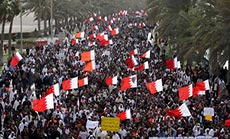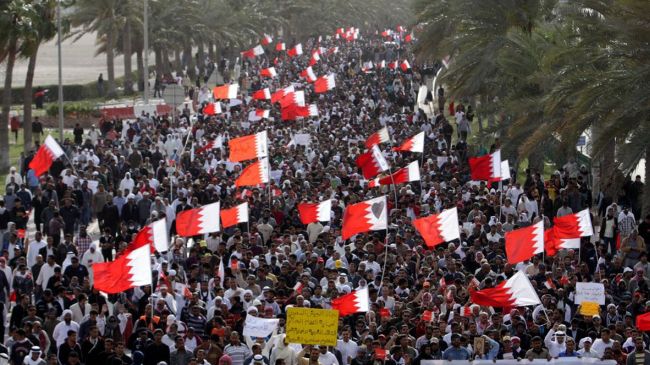
The Bahraini Crisis Towards Further Complications

Latifa Al-Husseini
Whoever keeps up with the revolutionary movement in Bahrain since its start in February 2011 is aware of the urgent need to achieve the demands of the people's shift towards democracy.

The opposition did not move its supporters in vain; the suffering of the people reached an extent that is unbearable: the marginalization, oppression and humiliation suffered by Bahrainis on a daily basis. The persistence of the authorities in belittling the people's rights is not encountered except in the language of the field.
The streets are filled weekly with protesters and marches organized by various political forces insisting on freedom of expression, and affirming the need for mutual trust between the ruling source and whoever runs the country.
Three years following the people's uprising in Manama, the Bahraini scene records further practices to silence the other voice- the voice whose goal is liberation from the glorification of the ruling family and reverence for all its actions and violations in the streets; the voice that is in opposition to the authorities of al-Khalifa family and its raids on secure homes, joints of the state and its public functions, its schools and universities, its markets, and even in its prisons and overcrowded detention camps.
The 55 km island lives a dire reality, with no solutions on the horizon and without any hope of success in the planned dialogue wherein the authorities do not make any effort in order to make it a success and achieve the aspirations of its people. Instead, they continue to pursue political maneuvers guaranteeing them all that is in their interest, calming down the "rebel" from the movement on the street who is against them, in light of its contempt for the slogans of Bahrainis and their demands.
On this basis, the political writer in the Wasat newspaper, Hani Al-Fardan, describes Bahrain's status as "inflated," and does not foresee "a soon recovery"; therefore, the movements will continue for a long time.
Al-Fardan believes that "the Bahraini authorities do not look for solutions, but for circumstantial ways out of the political crisis." In this context, he puts forth that, "its consent to the coming of an investigating commission to the Kingdom which can control it, as it did in the case of the International Labor Organization and those dismissed from their jobs." He says, "If it wanted to find a solution, they would have banned it long ago."
Based on the performance of the authority over the period of three years, Al-Fardan does not see any presence for any dialogue in the Kingdom." "When a ruler decides to solve the crisis of his country, a serious dialogue will take place to reach a conclusion." He points out here that, "the authorities exploit the dialogues to escape from the certain crisis, and today they are searching for a way out to save them from the ‘mess of the dialogue'. This can be translated through a big security incident such as an explosion, or an escalation to the earth," referring to the parental bombings that occurred this month.
Al-Fardan talks about "the entrance of Bahrain into a new and dangerous phase following the recent security incidents, and to an escalation of a more severe, violent, and bloody transition of the crisis, whether the actor is a public or official member.
From the security aspect, Al-Fardan pauses at the killing of the Emirates officer in the bombing in the capital two weeks ago to caution that the "United Arab Emirates fell in big trouble due to exposing itself of its involvement in suppressing the movements in Bahrain, especially as it previously announced its participation in the Peninsula Shield forces under the pretext of protecting vital installations in Bahrain. However, the presence of one of its officers in a distinctively residential and popular village refuted its allegations, and proved that there was no justification for the presence of its troops in Bahrain.
This confirms the presence of the Saudi and UAE troops in popular areas to exercise the duties of the Bahraini security forces, all the way down to wearing the same outfit as the Bahraini police; in this case, it would not be possible to differentiate between the nationalities of the Peninsula Shield forces.
According to Al-Fardan's point of view, the Gulf crisis that is emerging with Qatar does not affect the internal political situation in Bahrain; the leaderships of the Gulf Cooperation Council are in agreement despite all that is being said about dispute and the withdrawal of ambassadors to preserve their ruling authorities without detriment to any system that concerns them.
Al-Fardan does not distinguish between the announcement of the so-called "Islamic State of Iraq and the Levant" [ISIL] organization's intention to spread to the Arabian Peninsula and the news that circulated about the establishment of the organization in Manama. Even more, he thinks that "the ground is prepared for the birth of the so-called "Islamic State of Iraq and the Levant" [ISIL] on Bahraini territories."
In parallel, it seems that the Gulf's involvement in the fighting in Syria has a different reading in Bahrain, according to a monitoring source in the Kingdom. Despite the criminalization of Manama- fighting their nationals outside the country as did its ally, Saudi Arabia, cannot reduce this phenomenon at all, and all it can do is fight the advocates of "jihad".
Riyadh's categorization of the Muslim Brotherhood as a terrorist group has perplexed Manama because it does not withdraw them, and because the system of government in it is based on the inclusion of the Muslim Brotherhood in power, and therefore, there are two ministers in the government that are associated with the "Brothers" of Bahrain.
From here, it can be understood that the authority, today, does not want to get involved in a battle with this organization within its territories, but prefers to maintain its alliance with the Muslim Brotherhood and the Salafi movement in the Kingdom. The monitor concludes that the Brotherhood organization is a strong supporter of the Bahraini regime and that the uprising against it will hurt the latter very much, especially as its situation is sensitive and does not have what it takes in terms of differences with Saudi Arabia. Therefore, the contradiction between the statements made by the Bahraini foreign minister a few days ago can be explained that on the one hand, he is defending the "Brotherhood," and on the other hand, he is baffled when speaking about them.
The source draws attention in the conclusion that, "The position of the al-Khalifa regime of the Brotherhood will continue to be ambiguous: No war with them in order to preserve the interests of the power in many formal institutions that they control."



